
From the Deputy Assistant Secretary

It's amazing how quickly the year has gone by – we have almost made to the end of 2021! It’s been great to see so many schools open safely, and I know from personal experience how happy children are to be back in the classroom. I also know how hard you are working to support schools and educators to maintain safe and productive in-person learning environments. Given the difficulties, I am truly humbled by all that has been accomplished in the field and here in the Department in 2021, and the OESE team and I look forward to providing you with continued support in 2022.
In this newsletter, we focus on social emotional learning (SEL) resources. This sometimes overlooked component to learning is important during the best of times, but has become crucial during the pandemic. SEL can be powerful for developing the resilience we all need during the pandemic and is a lifelong skill to endure the challenges life hands us. This month, we include a number of resources from our Comprehensive Center Network, Region 13 Comprehensive Center, and the Equity Assistance Centers. These resources touch upon trauma informed approaches, social and emotional well-being and academic excellence, and supporting SEL as it relates to equity. This month’s Technical Assistance spotlight features the Title IV, Part A (T4PA) Center, which has a focus on supporting safe and healthy students. This includes mental health, which is another area of emphasis for the Department during this pandemic. We also share information about some helpful American Rescue Plan resources.
In addition, the Department recently released this new resource to support child and student social, emotional, behavioral, and mental health during the COVID-19 era. This resource is intended to supplement the information in the ED COVID-19 Handbook, including Volume 1: Strategies for Safely Reopening Elementary and Secondary Schools, Volume 2: Roadmap to Reopening Safely and Meeting All Students’ Needs, and Volume 3: Strategies for Safe Operation and Addressing the Impact of COVID-19 on Higher Education Students, Faculty, and Staff, by providing focused information to enhance the promotion of mental health and social and emotional well-being among students.
Finally, the Newsflash includes important resources related to vaccinations for our children and youth. We are pleased to provide direct links to resources from the Centers for Disease Control and Prevention (CDC) related to both vaccines and information on COVID testing in schools. Our commitment to safe and supportive learning environments continues to be strong, and we are here to support you in the hard work you do every day!
I hope you all get some rest and relaxation over the winter holidays and am looking forward to 2022!
Ruth Ryder
|

Featured Technical Assistance Center: Title IV, Part A (T4PA) Center
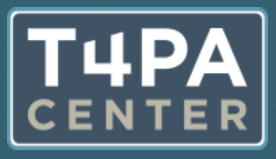
The Title IV, Part A (T4PA) Student Support and Academic Enrichment Program (SSAE) was authorized under the Elementary and Secondary Act of 1965, as amended by the Every Student Succeeds Act, in 2015. The Title IV-A program is intended to improve students’ academic achievement by increasing the capacity of states, local educational agencies (LEAs), schools, and local communities to:
- provide all students with access to a well-rounded education,
- improve school conditions for student learning, and
- improve the use of technology in order to improve the academic achievement and digital literacy of all students.
The following are examples of T4PA Center resources:
Contact the TA Center through one of the following means:
|

Meet Department Staff Member Hamed Negron-Perez
Learn more about Hamed Negron-Perez, federal program officer and contracting representative for the T4PA Technical Assistance Center.
How long have you been at the Department?
- I joined the Department in July 2010, when the Office of Safe and Supportive Schools was still called the Office of Safe and Drug Free Schools.
What do you most enjoy about working at the Department?
- I like being able to see the positive effects our grant programs have in students’ lives and education. It’s not just about curricular changes with us, it more about constantly improving the student’s conditions for learning. Plus, our office team has to be one of the tightest and most fun groups I have ever had the pleasure and honor of being a part of. Not only is everyone always performing at a high level, we also never have issues with either asking for or offering help to one another. No egos anywhere.
What is one thing you’d like to see happen for the T4PA Center in the next year?
- I would like to increase our footprint and reach, including possibly adding more processes/tools to help T4PA state coordinators create customized resources for their LEAs.
|

Centers for Disease Control and Prevention Updates
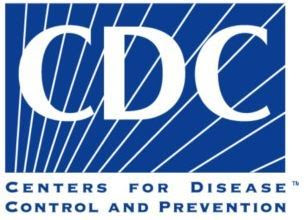
COVID-19 Vaccines for Children
The Centers for Disease Control and Prevention (CDC) recommends COVID-19 vaccines for children ages 5 through 11. Widespread vaccination for COVID-19 is a critical tool to best protect everyone, especially those at highest risk, from severe illness and death. People who are fully vaccinated can safely resume many activities that they did prior to the pandemic. Children ages 5 years and older now are able to get an age-appropriate dose of the Pfizer-BioNTech COVID-19 vaccine. Learn more about what you can do when you’ve been fully vaccinated. To learn more about vaccinations for children and teens, click here.
COVID Testing in Schools
In an effort to keep schools open and safe, the Department of Education and CDC will be providing resources to states and schools for testing and other mitigation efforts. Staff will be available to state health departments through the COVID Workforce Initiative to coordinate, execute, and expand on school-based COVID-19 testing, contact tracing/case investigation, and other public health activities. Additionally, a start-up guide is available for schools on how to launch screening testing programs. This includes released guidance for school districts on using American Rescue Plan funds to provide incentives to parents and guardians to participate in screening testing programs.
|
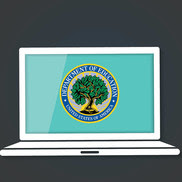
COVID-19 Data Dashboard
The Department of Education, in collaboration with CDC has launched a new COVID-19 data dashboard to help the public keep track of the impact of COVID-19 on K-12 schools. The dashboard aggregates in one location data on pediatric COVID-19 cases, youth vaccination rates, and numbers on schools that are operating in-person, hybrid or remotely. Data will be updated each week, and where possible, the information is presented geographically so that educators and families can understand the impact of COVID in their communities. This is the first time such data will be presented in a single location to the public.
|

Technical Assistance Resources: Social Emotional Learning

New Multimedia Package on Implementing Trauma-informed Approaches
This multimedia package from the National Comprehensive Center was created from a roundtable session in which presenters shared their insights and experiences in implementing trauma-informed approaches in various school settings. The panelists provide an overview of their planning processes, both at the school and district levels, and discuss how they got the funding, resources, and buy-in from school and district stakeholders to implement trauma-informed approaches, as well as how they addressed the challenges they faced during implementation.
|

Social Emotional and Behavioral Learning Collection
This resource collection by the Comprehensive Center Network includes informational resources for schools on trauma-informed practices and improving social, emotional, and behavioral learning. Resources in this collection include:
|
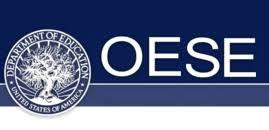
American Rescue Plan Homeless Children and Youth Program
In March 2021, Congress reserved $800M from the American Rescue Plan Elementary and Secondary School Emergency Relief fund (ARP ESSER) to establish a new program, the ARP Homeless Children and Youth (ARP-HCY) program, designed to address the unique impact that the COVID-19 pandemic has had on students experiencing homelessness. This amount was nearly eight times the most recent appropriation for the McKinney-Vento Education for Homeless Children and Youth (EHCY) program, which was funded at $106.5 million for FY 2021. The Department awarded all ARP-HCY funds by late July and required each grantee to submit a plan describing how the state would implement the ARP-HCY program and address the needs of students experiencing homelessness. All states submitted ARP-HCY plans in September, and the Department has been reviewing the state plans since that time.
The Department approved 28 State Plans in November and anticipates approving more in December. As for highlights, many states are hiring more staff, including specialists, to help children and youth and their families experiencing homelessness to navigate interrelated systems, such as early childhood and higher education, transportation, behavioral health, and housing. They report collaborating with state and regional community-based organizations with experience identifying and serving children and youth experiencing homelessness in historically underserved communities. States are also incorporating youth and adults with lived experience of homelessness in advisory councils and train-the-trainer programs for raising awareness of McKinney-Vento rights and services. While ample technical assistance has been provided by the Department and its National Center for Homeless Education (at SERVE at UNC-Greensboro), and from EHCY state coordinators to LEA homeless liaisons, there also will be considerable work needed to implement the new program through Sept. 30, 2024. Approved ARP-HCY state plans, and plans that remain in draft form, are available on this site.
|
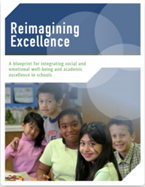
Reimagining Excellence: A Blueprint for Integrating Social and Emotional Well-Being and Academic Excellence in Schools
The Region 13 Comprehensive Center, in conjunction with the Oklahoma State Education Department, the Center to Improve Social and Emotional Learning and School Safety, and the National Center for Systemic Improvement, created Reimagining Excellence to provide school leaders with a blueprint of indicators of learning programs that successfully integrate equity, well-being, and academics. It was designed with input from in-person and remote educators, leaders, researchers, professional learning providers, and technical assistance providers. This blueprint establishes ambitious goals for comprehensively reimagining learning programs as school emerge from the COVID-19 pandemic.
|
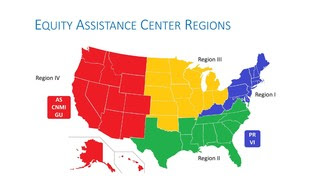
Social Emotional Supports From the Equity Assistance Centers
The Equity Assistance Centers offer a wide range of universal resources to support social and emotional learning, particularly as it relates to combatting discrimination based upon race, sex, national origin, and religion in public schools. Resources from the EACs include:
- Bio-Social-Emotional Needs of Immigrant Students, with a Focus on Central Americans from the Center for Education Equity (EAC Region I)
-
![]()
About the Author
Ruth Ryder is the Deputy Assistant Secretary for the Office of Office of State Grant and Program Support in the Office of Elementary and Secondary Education (OESE) at the U.S. Department of Education. In this role, Ms. Ryder oversees a broad range of management, policy, and program functions related to formula and discretionary grant programs under the Elementary and Secondary Education Act, as amended by the Every Student Succeeds Act (ESEA). Ms. Ryder was previously the deputy director of the Office of Special Education Programs in the Office of Special Education and Rehabilitative Services, which she joined in 1988. Prior to joining the Department, Ms. Ryder was a program administrator in a Washington state school district. There she had responsibility for the Elementary and Secondary Education Act Title 1 and Title II programs, state-remediation, gifted education, outcome-based education, and state- and district-wide testing programs. Ms. Ryder has a bachelor’s degree in psychology and elementary education and a master’s degree in special education.
Read next
Projects & Events
Bruman Group Spring Forum | April 29th - May 1st
USED & White House
President Signs Executive Order to Dismantle ED
USED & White House
ED Releases Guidance on Inclusive Practices Under IDEA and ESEA
| | |

